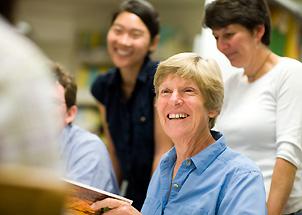 Dee Boersma is among 10 recipients of the Heinz Family Foundation awards given to people whose achievements have fostered a cleaner, greener and more sustainable world.
Dee Boersma is among 10 recipients of the Heinz Family Foundation awards given to people whose achievements have fostered a cleaner, greener and more sustainable world.
Boersma, a UW biology professor and holder of the Wadsworth Endowed Chair in Conservation Science, is being honored for her extensive field study of penguins and other sea birds to promote conservation and understanding human impact on marine environments.
In an effort to better communicate issues of the natural world to the public, she launched Conservation Magazine, a publication for cutting-edge science and smarter conservation (www.conservationmagazine.org).
For more than 25 years, she and her students, working with the Wildlife Conservation Society, have studied Magellanic penguins at the Punta Tombo reserve in Argentina.
She has dubbed the penguins "marine sentinels" for their warning signs about the ocean environment. Her recent work has shown that, because of climate change and other factors, during the critical period of egg incubation, the penguins at Punta Tombo must swim an average of 25 miles further in search of food than they did just 10 years ago.
Related Links:
Sylvia Earle's TED Prize Wish To Protect Our Oceans
The Mission Blue Voyage – a project of the TED Prize
2010-03-29
Posted in Profiles & Bios
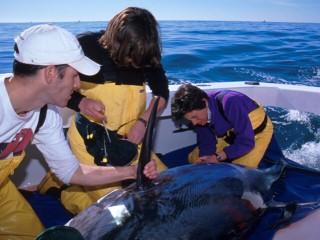 Dr. Barbara A. Block researches how large pelagic fish such as tunas, billfishes, and sharks, use the open ocean environment.
Dr. Barbara A. Block researches how large pelagic fish such as tunas, billfishes, and sharks, use the open ocean environment.
Professor Block and her colleagues at the Monterey Bay Aquarium have also established the Tuna Research and Conservation Center, a unique facility that permits physiological research on tunas. They are employing new techniques in wildlife telemetry and molecular genetics to directly examine the short and long-term movement patterns, stock structure and behavior of tunas and billfishes.
The fish are highly exploited in international fisheries and effective management of existing biodiversity requires an understanding of their biology and population structure.
The Block lab actively engages in research at sea to understand the movements and physiological ecology of tunas and billfishes and to gain insight into the selective advantage of endothermy in fishes.
Block and her colleagues are conducting research with a new type of remote telemetry device, call pop-up satellite archival tags. The tags are essentially computers that record navigational information, body temperature, depth, and ambient temperature data.
The information gained with these tags will improve our understanding of the biology of these species and increase our knowledge of stock structure. The successful implementation of the novel satellite and archival tag technology has provided marine researchers with new tools for studying inaccessible marine vertebrates.
Professor Block is a recipient of the Presidential Young Investigator Award from the National Science Foundation and the MacArthur Foundation Fellowship.
Related links:
Sylvia Earle's TED Prize Wish To Protect Our Oceans
The Mission Blue Voyage – a project of the TED Prize
2010-03-29
Posted in Profiles & Bios
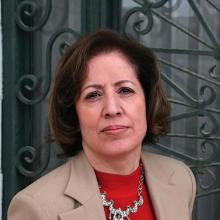 Dr. Faiha Abdulhadi is a writer, poet, research consultant, feminist, community and human rights activist and lecturer.
Dr. Faiha Abdulhadi is a writer, poet, research consultant, feminist, community and human rights activist and lecturer.
She was born in Nablus in 1951, and was arrested in 1969 at the age of 15, together with her mother, Issam Abdul Hadi, who, at the time, was the President of the General Union of Palestinian Women. She was then deported from Palestine, and lived in exile for 27 years.
Dr. Abdulhadi earned a BA in Arabic Literature from Jordan University, Amman; a BA in Theater Criticism from the Institute of Advanced Theatrical Art, Cairo; and an MA and PhD in Arabic Literature, Cairo University.
2009-12-28
Posted in Profiles & Bios
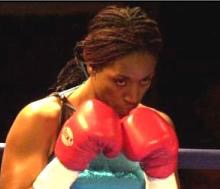 Jacqui Frazier-Lyde is an American lawyer and mother of three.
Jacqui Frazier-Lyde is an American lawyer and mother of three.
But her claims to fame are: 1) her decision in the year 2000, at the age of 38, to become a professional boxer, and 2) her determination to then go on to become a champion.
Though astounding due to her age, these feats are perhaps not as surprising viewed in the context of her lineage and abilities.
One of former world heavyweight boxing champion Joe Frazier’s 11 children, Frazier-Lyde excelled academically and athletically from an early age. She was class president at Plymouth-Whitemarsh High in Philadelphia, where she competed in basketball, hockey, softball and lacrosse.
She won an athletic scholarship to American University, and began her studies as a chemistry major. She switched into law at Villanova University, from which she graduated in 1988. After working as a public defender and in property law, she went on to open her own criminal law practice.
2009-12-26
Posted in Profiles & Bios
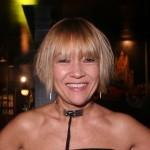 Susan notes: Thanks to TED for making TED Talks downloadable and embeddable, and for providing the biographical information that goes along with them.
Susan notes: Thanks to TED for making TED Talks downloadable and embeddable, and for providing the biographical information that goes along with them.
Cindy Gallop took a risk when she entered advertising, and hasn't stopped taking them since. She began her early career in the UK as a theater publicist, until an audience member declared that she could "sell ice to an Eskimo," and advised her to make the jump to advertising.
Four years later, she joined one of the fastest growing agencies in Europe, Bartle Bogle Hegarty. In 1998, she moved to New York, alone, and began building their US branch. Four years after that move, BBH US was named Adweek’s Eastern Agency of the Year.
After all her success in the agency world, Gallop resigned as chairman of BBH in 2005 to do something different. Today, she continues to work in branding and advertising as a consultant, but is also tending some fascinating projects of her own.
She launched MakeLoveNotPorn at TED2009, in an attempt to squash the myths of hardcore pornography and to begin a dialog around how real people have sex. In January 2010, Gallop will officially launch IfWeRanTheWorld, a simple, web platform designed to bring together human good intentions and corporate good intentions, and turn them into collective action.
Related links:
2009-12-02
Posted in Profiles & Bios
 Dee Boersma is among 10 recipients of the Heinz Family Foundation awards given to people whose achievements have fostered a cleaner, greener and more sustainable world.
Dee Boersma is among 10 recipients of the Heinz Family Foundation awards given to people whose achievements have fostered a cleaner, greener and more sustainable world. Dr. Barbara A. Block researches how large pelagic fish such as tunas, billfishes, and sharks, use the open ocean environment.
Dr. Barbara A. Block researches how large pelagic fish such as tunas, billfishes, and sharks, use the open ocean environment. Dr. Faiha Abdulhadi is a writer, poet, research consultant, feminist, community and human rights activist and lecturer.
Dr. Faiha Abdulhadi is a writer, poet, research consultant, feminist, community and human rights activist and lecturer. Jacqui Frazier-Lyde is an American lawyer and mother of three.
Jacqui Frazier-Lyde is an American lawyer and mother of three. Susan notes: Thanks to
Susan notes: Thanks to